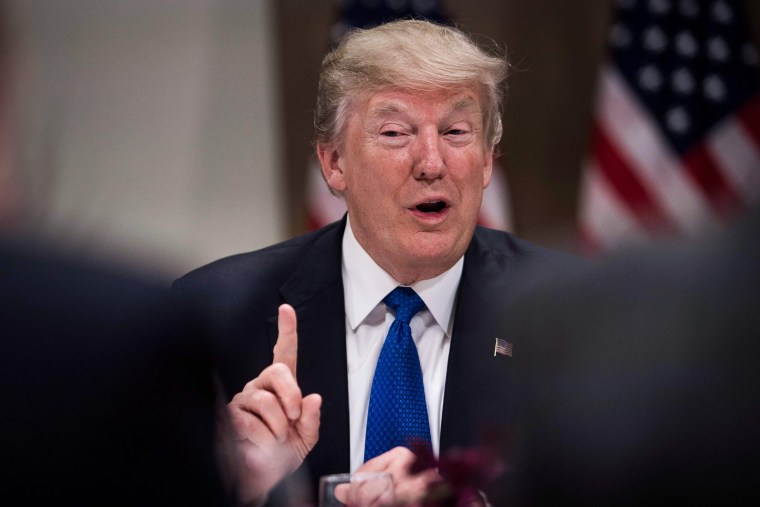Donald Trump boasted over the weekend, "Our economy is better than it has been in many decades." I wish that were true. It's not.
But the president is nevertheless convinced that everyone will be convinced of his awesomeness if only he can (a) persuade the nation that we're in the midst of an economic boom; and (b) demand credit. To that end, Trump is painting a portrait that doesn't reflect reality.
Take, for example, the president's remarks on Friday at the World Economic Forum in Davos, Switzerland.
"After years of stagnation, the United States is once again experiencing strong economic growth.... Since my election, we've created 2.4 million jobs, and that number is going up very, very substantially. "
Neither of these claims is accurate. Economic growth in 2017 -- Trump's first year in office -- wasn't bad at 2.3%, but GDP growth was better in 2010, 2014, and 2015. What's more, while the president apparently hopes everyone has forgotten his campaign vows, GDP growth wasn't just slower than it was across much of Barack Obama's second term, it's also short of Trump's misguided promises.
As for job numbers, while I enjoyed the "since my election" feint -- Trump wants credit for the jobs created in the months before he took office -- the simple reality is that job growth fell to a six-year low in 2017. To date, the White House hasn't even tried to explain this development.
At Davos, the president also pointed to the stock market and stock prices six times, failing to note that Wall Street growth was actually more robust under Obama.
In the same speech, Trump added, "The world's largest company, Apple, announced plans to bring $245 billion in overseas profits home to America. Their total investment into the United States economy will be more than $350 billion over the next five years."
No, actually, it won't. As Vox explained, "What Apple actually promised was to make $30 billion in domestic capital investments, most of which will be data centers, offices, and Apple Store real estate upgrades rather than actual manufacturing facilities. The $350 billion measure is a rough five-year estimate of Apple's total 'contribution' to the American economy. If you're playing Infinite Golf on your iPhone and make an in-app purchase, that contributes to GDP. Since the contribution is routed through Apple, your spending becomes part of the Apple contribution to the American economy. It's a semi-fake measure that's basically a long-winded way of saying that Apple is a very big company."
My point isn't that the economy is somehow awful. It's clearly not. I'm also not suggesting that Trump has somehow ruined the economy. He hasn't.
But Trump, with few genuine accomplishments, is searching desperately for evidence of his success, which has led him to believe the economy "is better than it has been in many decades." It's a claim that props up his entire presidency: we should overlook the scandals, the corruption, the incompetence, the mismanagement, the lies, and the assaults on our institutions and political norms, the argument goes, because Trump is leading the nation to broad prosperity.
Whether this is a suitable trade-off would be a subject worthy of debate if it weren't a sham. Job growth wasn't bad in Trump's first year, but it fell far short of what Americans have seen over the last several years. Growth wasn't bad, either, but Americans have seen better growth -- recently.
What's more, the problem extends beyond the dishonesty of the pitch. There are also policy consequences to consider: if the president believes, genuinely but falsely, that he's created the strongest economy "in many decades," it will affect his thinking about how to make things better.
Will the president who already thinks he's created an economic utopia for all fight for a higher minimum wage? How about his willingness to demand investments in education and infrastructure ? Will he encourage the Fed to prioritize growth over curbing inflation?
Or will he deem all of this unnecessary since he's already created the healthiest economy "in many decades," facts be damned?
Maybe Trump knows his economic record is underwhelming, and he's just straight up lying. Perhaps the amateur president is confused and has convinced himself that his talking points are accurate.
Either way, wouldn't it be better for everyone, including Trump, if he had an accurate grasp of economic realities?
